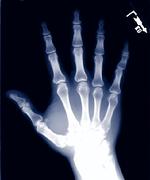| What is “the Shot”?
Depo-provera is a progestin-only injectable form of birth control given in your doctor's office every 3 months. It is injected into either your upper arm or buttocks. The next shot should be scheduled in 12 weeks--this gives you a week or two of flexibility if you are unable to keep that appointment. In our office, we will give you a prescription to fill and you will bring it to the office.
|
How does the Shot work?
It prevents pregnancy by stopping ovulation (the release of an egg from the ovary). It thickens the mucus around the cervix. This prevents sperm from entering the cervix and alters the lining of the womb to inhibit implantation of the pregnancy.
|
|
How effective is the Shot?
Depo-Provera is more than 99% effective. Of every 1,000 women who use this method, 3 will become pregnant during first year of use. This is one of the most effective forms of birth control.
|
|
| Am I a good candidate for the Shot?
Depo-Provera is worth considering if you want long-term contraception without following a daily routine. Since protection is maintained from a shot every 3 months, it allows for sexual spontaneity.
|
|
It may also be a good choice for you if you cannot remember take a pill everyday or if you cannot use birth control containing estrogen (i.e. you are over 35 and a smoker or have a history of blood clots.) It is also a good choice if you do NOT plan to become pregnant in the near future and want a reliable form of birth control other than the pill.
The shot does not protect from sexually transmitted diseases particularly HIV. If this is a concern you should use a condom as well.
|
Are there any reasons why I shouldn’t use the Shot?
Most women of any age needing birth control can use Depo-Provera. A woman should not use the shot if she has history of:
×active liver disease
×current or past history of breast cancer
×unexplained vaginal bleeding
|
|
What are the common side effects of the Shot?
Depo-provera is a progesterone-only form of birth control. It does not contain estrogen. Therefore, women will not experience such symptoms as breast tenderness or nausea which are due to the estrogen. Also women who have a history of blood clots or smokers over 35, who cannot take estrogen, would still be a candidate for any progesterone-only contraceptive. However, smokers of any age should quit! The estrogen component of birth control periods does provide a more regular, predictable period.
Click on the images below to review the side effects of depo-provera in detail.
|
 |
| Irregular bleeding |
|
|
 |
| Weight gain |
|
|
 |
| Delay in the return of your period |
|
|
 |
| No immediate way to stop this method |
|
|
 |
| Reversible bone loss |
|
|
 |
| Mood changes |
|
|
What are the benefits of the Shot?
·easy to use--all you have to remember is to go to your health care provider for a shot 4 times a year
·extremely reliable—this form of birth control has one of the lowest failure rates
·confidential--no one other than your health care provider needs to know you are using it
·decreases menstrual cramps and blood loss--after 1 year of use 50% of women will no longer get their period
·reversible--although expect a delay in the return of your period of 10 months on average
·protective effect in reducing the risk of endometrial cancer
|
|
| When can I start taking the Shot?
We will only give you the Depo-Provera within 5 days of the start of your menstrual period. This ensures that you are NOT pregnant when you receive the shot and it will be effective immediately. Before you get each shot we will check that you have a negative urine pregnancy test.
|
Another time to start this method is after the end of a pregnancy; either at the time of termination of pregnancy or within 5 days postpartum if NOT breastfeeding. If you plan to breastfeed, Depo-Provera is a safe method of birth control but we recommend waiting until 6 weeks postpartum when the milk supply is fully established. If you initiate Depo-Provera after the birth of a child, keep in mind the delay in return of your menstrual cycle once you stop the method if you are planning to have another baby within the next year or so. In that case, you may want to select a different form of birth control.
|
What If I am late for my next Shot?
If you are late for your Depo-Provera, we want to make sure that you are NOT pregnant. However, now we need to do a blood pregnancy test to make sure you are not pregnant. This is much more sensitive than a urine test. The blood test usually takes one day for results. If negative, you could return the next day for your injection but you should use condoms as a backup method for the next two weeks.
|
|
Are there any warning signs I should look out for once I start the Shot?
|
Call your doctor if you have any of the following problems:
·repeated, very painful headaches
·severe lower abdominal pain
·depression
·heavy bleeding (soaking more than 1 menstrual pad per hour)
·pus, prolonged pain, or bleeding at injection site
|
|
|
|